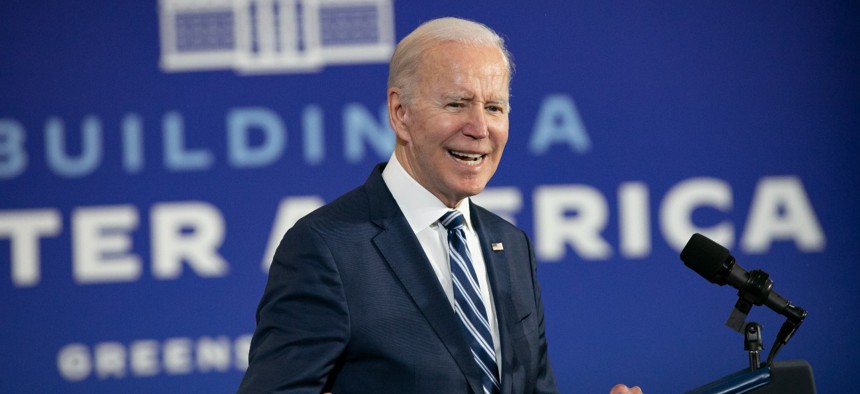Here’s What the New ‘Buy America’ Infrastructure Commitments Mean for Agencies

President Biden speaks to guests during a visit to North Carolina Agricultural and Technical State University on April 14 in Greensboro, North Carolina. Allison Joyce/Getty Images
Waivers can be issued under certain circumstances, but proposed exceptions must be made available to the public and approved by an office within OMB.
The White House issued guidance to federal agencies on Monday outlining obligations to procure materials domestically for infrastructure projects.
Included in the $1.2 trillion Infrastructure Investment and Jobs Act was the bipartisan, “Build America, Buy America Act,” which applies “Buy America” to all taxpayer-funded infrastructure and public works projects. The new 17-page guidance, released by the Office of Management and Budget, furthers this act as well as aligns with the “Made in America” executive order that President Biden issued shortly after coming into office.
May 14 is the deadline from the infrastructure package for “the head of each covered federal agency [to] ensure that ‘none of the funds made available for a federal financial assistance program for infrastructure, including each deficient program, may be obligated for a project unless all of the iron, steel, manufactured products, and construction materials used in the project are produced in the United States,’” wrote Shalanda Young, OMB director.
“This guidance applies to all federal financial assistance…whether or not funded through [the Infrastructure Investment and Jobs Act] —where funds are appropriated or otherwise made available and used for a project for infrastructure,” she continued. “Federal financial assistance means assistance that non-federal entities receive or administer in the form of grants, cooperative agreements, non-cash contributions or donations of property, direct assistance, loans, loan guarantees and other types of financial assistance.”
Agencies will determine how to apply the guidance to their infrastructure programs and processes and seek help from OMB if needed. Also, OMB may update or supplement this guidance going forward, said Young.
There are three situations in which agency heads may issue waivers to the “Buy America” preferences: when it is not in the public interest; when the materials are not sufficiently available in the United States; or when using the materials would increase the cost of the project overall by more than 25%. Before an agency issues a waiver, it must make the proposed waiver available publicly on its website with a detailed explanation and give at least 15 days for the public to comment on it. Agencies must then submit the proposed waiver to the Made in America Office, which is housed within OMB, for review and a determination as to whether the waiver will be accepted.
In limited, urgent situations agencies can waive the “Buy American” preferences without submitting the waiver for public comment and the Made in America Office’s approval.
OMB also issued interim and non-binding guidance on “manufacturing processes” for construction materials in order to assist agencies in determining which materials are “construction materials” so that agencies can begin applying Buy America requirements.
Just last week, Sen. Sherrod Brown, D-Ohio, who authored the “Build America, Buy America Act,” wrote to Young that the May 14 deadline was “fast approaching.” He urged her to “issue clear guidance to ensure that all federal agencies meet both the congressional intent and the spirit of the law.” He also said the Biden administration should “use this unique and historic opportunity to develop a cross-agency strategy to invest in American production.”
But Stephen Sandherr, the chief executive officer of the Associated General Contractors of America, said in a statement on Monday that the new guidance is “the kind of red tape initiative that undermines Americans’ confidence in the federal government’s ability to effectively use their tax dollars.”
Also, “the new mandate requires individual federal agencies to run waivers by the White House for materials not made in America,” which “means that contractors, in addition to facing a patchwork of inconsistent, and likely conflicting, guidelines from individual agencies’ waiver processes, will also have to wait as the highest office in the land verifies them.”
On a trip to Greensboro, North Carolina last week to champion the infrastructure package, Biden said: “From Day 1, every action I've taken to rebuild our economy has been guided by one principle: Made in America. It takes a federal government that doesn't just give lip service to buying American, but actually takes action.”
The president also noted that his administration issued a final rule in March that will take effect later this year that is “one of the biggest changes to the Buy American Act in 70 years.”






